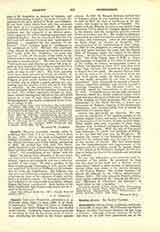

Cassini, GIOVANNI DOMENICO, astronomer b. at Perinaldo (Nice, Italy), June 8, 1625; d. at Paris, September 14, 1712. After two years at Vallebone he entered the Jesuit College at Genoa and studied under Casselli. Coming by chance across some books on astrology, he took up the serious study of astronomy, abandoning his belief in the former pseudo-science. In 1644 the Marquis Malvasia invited him to Bologna, where he was building an observatory. In 1650 he filled the chair of astronomy at the university, left vacant by the death of Cavalleri. Together with the Marquis Tanara he was sent to Pope Alexander VII to plead for Bologna against Ferrara in the dispute over the navigation and the courses of the rivers Reno and Po. His studies in hydraulic engineering procured for him the position of inspector of water and waterways. Later he was appointed by Mario Chigi, the brother of Alexander VII, superintendent of the fortifications of Fort Urban. In 1663 he was delegated to arrange the difficulty that had arisen between the pope and the Grand-duke of Tuscany, about the course of the River Chiana. All this time he continued his astronomical work. The Abbe Picard., prior of Rille in Anjou and successor of Gassendi in the chair of astronomy at the College de France, recommended Cassini to Colbert, the Minister of Louis XIV, and after some delay Pope Clement IX consented to lend Cassini to France for a few years. He reached Paris in 1669. In 1671 he went to live in the observatory which was then built partly under his direction. In 1673 he was finally persuaded by the king to become naturalized. Soon afterwards he married a French-woman, Genevieve Delaftre, and became himself a thorough Frenchman. His blindness (1711) was probably caused by over-exertion in the course of his work. Fontenelle points out his calm and gentle character, based on a deeply religious nature, which made him bear almost cheerfully even total blindness. While working for Pope Alexander VII he sent a manuscript to the Jesuit Riccioli, a friend and astronomer at Bologna, treating of the Immaculate Conception, and recommending that it should be celebrated as a special feast.
Cassini was principally an observer. We owe to him the calculation of the rotation periods of the planets Jupiter, Venus, and partly of Mars, by means of observations of the motion of spots on their disks. These results were very important in those days, because they furnished analogues to the disputed motion of the earth. With the aid of Campani’s long telescopes, he added four satellites of Saturn to the one that had been seen by Huyghens. He studied the causes of the librations of the moon, observed the zodiacal light, and developed a theory of the motion of comets. His first achievement was the reestablishment and improvement of the gnomon and the meridian, traced by Ignazio Dante in the church of St. Petronius, Bologna, for the purpose of fixing the time of the solstices and reforming the calendar.
He was very industrious, and constantly held the attention of the public. He interested the king and the court in his work, and as director of the observatory trained a great number of astronomers, among whom were many of the Jesuits belonging to the Chinese Mission. His Italian memoirs are almost all collected in his “Opera Astronomica” (Rome, 1666). His very numerous French publications appear scattered in the “Journal des Savants” and “Memoires de l’Academie des Sciences”, of which latter he was a member.
WILLIAM FOX

